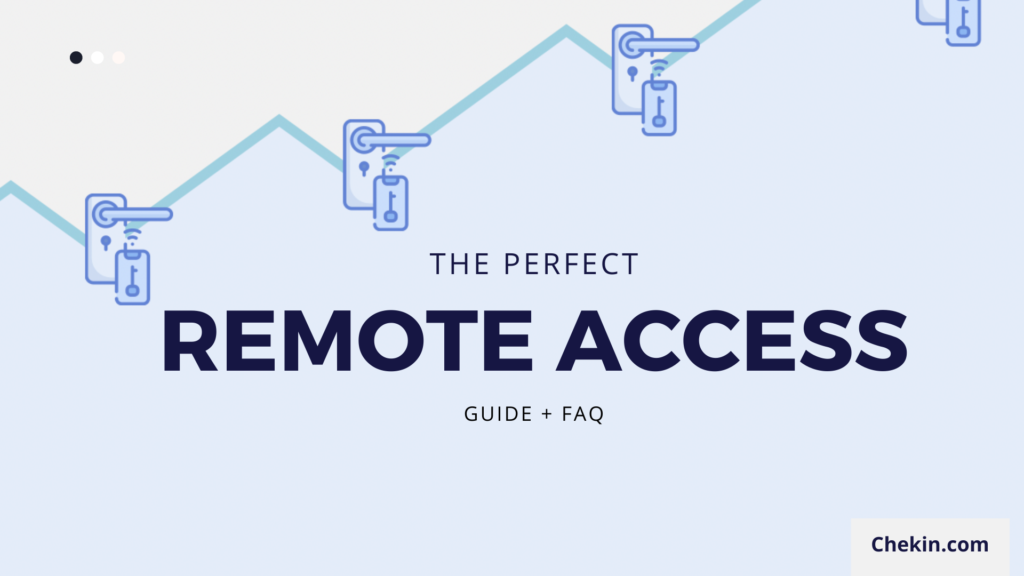More and more tourist accommodations are offering their guests the possibility of accessing the property autonomously, at any time and without contact. Something that is in high demand nowadays.
In addition to the convenience, it offers guests a more attractive experience as they do not have to deal with the host or agree on an arrival time.
But it is not only an advantage for guests. Hosts or owners will no longer need to adjust their schedules or modify their routines to travel to the property for key handover, so they can save hundreds of hours in managing their properties remotely.
There are different types of remote access, here are the 3 most used in the market:
Keybox
It consists of a small safe box to store the keys to your property. Its opening mechanism consists of a simple electronic or mechanical code that allows you to unlock the lock and obtain the key stored inside.
Another advantage is that it is small in size and not connected to electricity. For that reason, it can be installed on any wall in just a few minutes without having to modify or change anything in the structure of the traditional door of the house or it can even be chained to a firm structure for greater convenience. (Like metal grilles)
Thanks to their material they are usually quite robust and resistant, so they are very difficult to break and knock open.
Advantages:
-The price, since it is a single payment, quite affordable.
-Easy to buy, you can find them on Amazon.
-Easy to assemble, you can install them wherever you want.
-Simple and manual use, you won’t need to configure anything.
Disadvantages:
-They can cause mistrust, as they are exposed in the street and contain the key to the house.
– The code is changed manually, so every time a guest leaves your accommodation, if you want to change the code, you will have to go to the property.
– As it is a more manual process, it is more difficult to automate.
The use of these key safes is very common in tourist accommodation and airbnb, as it facilitates autonomous entry in a simple and easy way.
Key pick-up point
Having a local or key pick-up point is another option by which you can offer remote access to your guests.
Working with a key exchange system is the easiest and most practical option to provide this type of independent arrival. These companies work with a huge network of pick-up points all over the cities, where you can deposit your keys in small lockers inside the premises. As the network is so extensive, it is easy to choose a location that is close to your home, and they are usually open 24 hours a day.
The key collection process is quite simple: When your guest’s booking is confirmed, you can send them an email with the address of the venue and the digital code to open the locker.
The guest will only have to go to the indicated point, enter the code that opens the locker, and take the key. Easy, safe and simple.
Once their stay is over, they must return to the same point where they picked up the key, a new code will be sent to them to open the locker, and they will deposit the key again. Depending on the premises, the attendant may be able to manage the process himself.
At each key collection and key deposit, the host or owner will be notified by email. In addition, your keys will be assigned an electronic key fob, with which you can locate through the APP where your keys are at any time thanks to the built-in GPS.
At Chekin we are integrated with key exchange systems such as Keynest or Keycafé, to provide hosts with a fully automatic and synchronised process, from the moment the reservation is created, the online check-in is done, and they can allow the guest to arrive autonomously, using a single tool.
Advantages:
-Avoidance of trips to the property to hand over the keys.
-Safe system, as the keys are not exposed, you will have 24-hour supervision and access to them.
-You will be able to track where the keys are at all times thanks to GPS.
Disadvantages:
-There may not always be a collection point near your home.
-If the pick-up point is not particularly close, it can be a barrier for your guests to travel there.
-The guest experience with this system is uncertain. There are guests who want to arrive at the property after a long journey, and having to travel to another location can be a disadvantage.
Smart Locks
Unlike the previous remote access systems, this one consists of installing a new lock on the door of your accommodation, dispensing with the need for physical keys.
The operation is very similar to that found in conventional locks, but it is based on an electronic system that keeps the door closed until the mechanism is activated and the locks are released. It’s like inserting an invisible key and then pressing it to open the door.
Smart locks are connected to Wifi or low power radio waves (known as Z-wave technology), to control the different ways of opening, all from the same APP on your mobile phone. They are usually battery operated for low power consumption and are easy to install as they have no wires.
These locks normally require installation as they are installed on an existing part of the lock, for example on the interior handle, providing an electric locking motor that drives the mechanical components to open the door.
Within these Smart locks, we can find different types of opening systems, the most common being:
- Locks with tactile keypad:
These locks could be said to be similar to Keybox locks in terms of operation. They have a security code that must be entered in order to open the door and gain access to the property. Easy and simple.
They also have the option to activate the lock and open the door directly from the application.
The advantage over traditional Key Boxes is that this lock is digital, and is linked to its corresponding App (depending on the provider), so the access code can be changed remotely, via the app.
- Sensor locks:
These smart locks are characterised by working through an App that connects directly to our smartphone (via Wifi or Radio Frequency Sensor) , being able to open and close the door of our house remotely.
They are widely used in tourist accommodation and hotels, as these lock providers allow the owner to create virtual keys to give access to anyone they wish.
These virtual keys are sent via a link to the telephone, where it will create a profile for the user linked to that lock, which will allow them to open and close the door of the accommodation.
Once the guest leaves the accommodation, the virtual key will stop working.
The electronic lock is a tool that greatly facilitates the management of tourist accommodation, and has advantages over traditional locks.
Advantages:
-You will not need to use more physical keys, so you avoid the danger of losing them and someone making copies.
-You will not need to go to the property to hand over the keys.
-You can create as many virtual keys as you wish, being linked to the profile of your guests.
-You will have control of the lock at all times wherever you are.
-Possibility of automating the sending of the virtual key after receiving a reservation.
Disadvantages:
-Like any technological system, they sometimes require updates, and if you stop receiving them they can start to lose functions.
-They require installation and assembly.
-They are more expensive than other remote access systems.
-They look much bulkier and more conspicuous than traditional locks.
– Problems can arise with the power supply or batteries that make it work.
FREQUENTLY ASKED QUESTIONS
If I use a Smart Lock in my flat, how do I allow access to the building from the street?
You will be able to connect your electronic lock to the community entry phone (as long as it is on the compatibility list), allowing you to press the button on the doorbell of your flat to activate the lock and open the door. You can also configure it to open the door from your Smartphone.
The idea of offering Bluetooth to your phone may sound like science fiction, but it’s actually quite simple to set up. Depending on the lock provider you use, you will have to follow different instructions.
Do I have to ask permission from my neighbours?
No. The installation of the electric lock is done on your door, and the connection to the telephone is done from inside the house, so no modifications are made to the common areas and, therefore, you do not have to ask for permission from the community of neighbours.
How does it benefit to use a self check-in system in my holiday accommodation?
Allowing remote access in your holiday rental will undoubtedly be an advantage for both parties.
On the one hand, the experience of your guests will be very favourable, as you will allow them a totally flexible arrival time, without the need to readjust their travel itinerary, something they will certainly appreciate.
Reducing contact with the host to a minimum is a crucial point in this new normality, as you will offer a more secure service with zero contact, something highly sought after by travellers.
Improving the experience of your guests will lead to more reviews, which will benefit an increase in your bookings, in addition to the time the owner will save by not having to travel to the property.
How do I connect Chekin to my smart lock?
Very simple! Chekin is integrated with most remote access companies, so enabling synchronisation between the two tools is very easy and intuitive.
Go to our integrations section, search for your provider and connect it directly with your Chekin account. Once connected, all data will be synchronised automatically.
If you still have questions, feel free to contact us here.
What if I lose my phone and it’s connected to a lock?
Don’t worry, smart locks are not connected directly to your smartphone, but to your user account within the app, so if you lose your phone, you just need to log out of your account on all devices, and use it again on your new phone. Easy and secure.
Is it legal not to identify guests in person?
No, what the law requires is the following: “The owner or manager is required to identify all travellers over the age of 16, fill in a “Guest House Report”, draw up a Book-Register of Travellers and report the entry within 24 hours to the Local Police, National Police or Civil Guard, depending on the municipality or district that corresponds to the location of the dwelling. For their part, each traveller is only obliged to sign the entry report”.
So, the important thing is to identify your guests legally, no matter if it is in person or through a digital and automatic system such as Chekin, as we comply 100% with the law.







